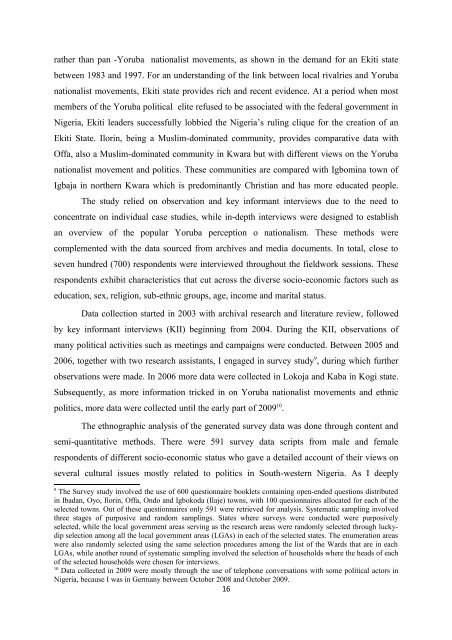The Yoruba Nationalist Movements, Ethnic Politics and Violence: A ...
The Yoruba Nationalist Movements, Ethnic Politics and Violence: A ...
The Yoruba Nationalist Movements, Ethnic Politics and Violence: A ...
You also want an ePaper? Increase the reach of your titles
YUMPU automatically turns print PDFs into web optimized ePapers that Google loves.
ather than pan -<strong>Yoruba</strong> nationalist movements, as shown in the dem<strong>and</strong> for an Ekiti state<br />
between 1983 <strong>and</strong> 1997. For an underst<strong>and</strong>ing of the link between local rivalries <strong>and</strong> <strong>Yoruba</strong><br />
nationalist movements, Ekiti state provides rich <strong>and</strong> recent evidence. At a period when most<br />
members of the <strong>Yoruba</strong> political elite refused to be associated with the federal government in<br />
Nigeria, Ekiti leaders successfully lobbied the Nigeria’s ruling clique for the creation of an<br />
Ekiti State. Ilorin, being a Muslim-dominated community, provides comparative data with<br />
Offa, also a Muslim-dominated community in Kwara but with different views on the <strong>Yoruba</strong><br />
nationalist movement <strong>and</strong> politics. <strong>The</strong>se communities are compared with Igbomina town of<br />
Igbaja in northern Kwara which is predominantly Christian <strong>and</strong> has more educated people.<br />
<strong>The</strong> study relied on observation <strong>and</strong> key informant interviews due to the need to<br />
concentrate on individual case studies, while in-depth interviews were designed to establish<br />
an overview of the popular <strong>Yoruba</strong> perception o nationalism. <strong>The</strong>se methods were<br />
complemented with the data sourced from archives <strong>and</strong> media documents. In total, close to<br />
seven hundred (700) respondents were interviewed throughout the fieldwork sessions. <strong>The</strong>se<br />
respondents exhibit characteristics that cut across the diverse socio-economic factors such as<br />
education, sex, religion, sub-ethnic groups, age, income <strong>and</strong> marital status.<br />
Data collection started in 2003 with archival research <strong>and</strong> literature review, followed<br />
by key informant interviews (KII) beginning from 2004. During the KII, observations of<br />
many political activities such as meetings <strong>and</strong> campaigns were conducted. Between 2005 <strong>and</strong><br />
2006, together with two research assistants, I engaged in survey study 9 , during which further<br />
observations were made. In 2006 more data were collected in Lokoja <strong>and</strong> Kaba in Kogi state.<br />
Subsequently, as more information tricked in on <strong>Yoruba</strong> nationalist movements <strong>and</strong> ethnic<br />
politics, more data were collected until the early part of 2009 10 .<br />
<strong>The</strong> ethnographic analysis of the generated survey data was done through content <strong>and</strong><br />
semi-quantitative methods. <strong>The</strong>re were 591 survey data scripts from male <strong>and</strong> female<br />
respondents of different socio-economic status who gave a detailed account of their views on<br />
several cultural issues mostly related to politics in South-western Nigeria. As I deeply<br />
9<br />
<strong>The</strong> Survey study involved the use of 600 questionnaire booklets containing open-ended questions distributed<br />
in Ibadan, Oyo, Ilorin, Offa, Ondo <strong>and</strong> Igbokoda (Ilaje) towns, with 100 quesionnaires allocated for each of the<br />
selected towns. Out of these questionnaires only 591 were retrieved for analysis. Systematic sampling involved<br />
three stages of purposive <strong>and</strong> r<strong>and</strong>om samplings. States where surveys were conducted were purposively<br />
selected, while the local government areas serving as the research areas were r<strong>and</strong>omly selected through luckydip<br />
selection among all the local government areas (LGAs) in each of the selected states. <strong>The</strong> enumeration areas<br />
were also r<strong>and</strong>omly selected using the same selection procedures among the list of the Wards that are in each<br />
LGAs, while another round of systematic sampling involved the selection of households where the heads of each<br />
of the selected households were chosen for interviews.<br />
10<br />
Data collected in 2009 were mostly through the use of telephone conversations with some political actors in<br />
Nigeria, because I was in Germany between October 2008 <strong>and</strong> October 2009.<br />
16

















